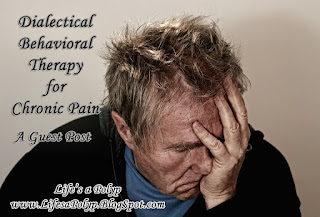Disclaimer: I have been given this product as part of a product review through the Chronic Illness Bloggers network. Although the product was a gift, all opinions in this review remain my own and I was in no way influenced by the company.
Cannabis has been in the news quite a bit over the last few years particularly for its medicinal properties and this includes those of the compound CBD found within the plant. There are several well known benefits of cannabis but my interest lied in the benefits possible for nausea and pain as these are two issues I experience on a daily basis. Medical marijuana isn't yet legal where I live and I have no interest in the psychoactive properties of marijuana's THC compound. However, the CBD compound can be made into a oil from the hemp part of the cannabis plant allowing the medicinal properties to be accessed without psychoactive properties. Cannabis compounds, or cannabinoids, attach to receptors within the human body producing particular effects. The human body even produces certain cannabinoids itself. The receptor that CBD interacts with is CB2 and has specific effects on inflammation and pain. There are some side effects such as tiredness and sometimes change in bowel habits, appetite, and weight. For more information regarding CBD oil visit Medical News Today.
I consented to review BioCBD+ to discover any benefits for my nausea and abdominal pain. According to BioCBD+, CBD Oil can help with the following conditions so I was hopeful.
| CBD: Past, Present and Future Premier Issue #1 |
 The suggested dosage of BioCBD Total Body Care is 1-2 capsules a day to support and maintain total wellness or up to 5 capsules per day for treating severe discomfort.
The suggested dosage of BioCBD Total Body Care is 1-2 capsules a day to support and maintain total wellness or up to 5 capsules per day for treating severe discomfort.
It didn't include instructions for when to take the capsule in regards to time of day or with meals. I started by taking one capsule per day in the late afternoon, typically following an early dinner.
The first time I took BioCBD Total Body Care I was experiencing severe abdominal pain and bloating that day. I did notice within half an hour a reduction in my pain; the pain didn't cease but it did decrease in severity.
My chronic nausea was tolerable except for one day when I experienced a mysterious licorice odor for a full work day in spite of being unable to locate any source of such an odor. This licorice odor caused severe nausea that required me to utilize a medical mask and peppermints to cope with the nausea.
After 2-3 days of taking one capsule per day, I began to notice slight insomnia. I didn't experience an increase in energy level just an increased difficulty to sleep. I typically go to sleep between 9 pm and 10 pm. I was no longer feeling ready for sleep by 9 pm but instead it was becoming closer to 1 am before I could sleep. However, when I did sleep, I slept very hard and awoke rested.
After 2-3 days of taking one capsule per day, I began to notice slight insomnia. I didn't experience an increase in energy level just an increased difficulty to sleep. I typically go to sleep between 9 pm and 10 pm. I was no longer feeling ready for sleep by 9 pm but instead it was becoming closer to 1 am before I could sleep. However, when I did sleep, I slept very hard and awoke rested.
It was around the same time frame that I noticed two other effects. I developed an insatiable appetite and my Short Bowel Syndrome worsened. I increased from my usual 15 to 20 bowel movements a day to 30 or more per day. My skin was becoming perpetually sore and raw from the increased bowel movements.
After a week of taking the BioCBD Total Body Care the worsened Short Bowel had become unbearable. The frequency and urgency of restroom trips started interfering with my ability to function at work and limited my ability to participate in activities. I didn't want to leave me house. The benefits of reduction in abdominal pain and nausea wasn't outweighing the increased bowel movements and their effects on my skin and my daily functioning ability. I decided to discontinue the supplement to see if my symptoms improved. After 2-3 days without the supplement my symptoms did indeed improve but not before I had a Short Bowel flare that left me incapacitated for a full day.
My appetite returned to normal and 5 days after discontinuing the capsules I noticed another significant decrease in my appetite. Food no longer sounded appetizing, I no longer had food cravings.
With CBD Oil's ability to target inflammation, I thought perhaps this product would be better suited for my mother as my mother has arthritis and experiences inflammation more than I do. My mother shares my two rare diseases of Familial Polyposis and Short Bowel Syndrome so she has similar GI issues. However, in addition she has Diabetes, Arthritis, and an ileostomy whereas I have a straight pull through - not an ostomy. So perhaps, I thought, if she does experience a change in bowel movements, it wouldn't be quite the interference that I experienced. She obtained approval from her Nephrologist to start the BioCBD Total Body Care capsules.
My mother consulted her Nephrologist and with approval started taking one pill a day and tried taking the capsule at various times throughout the day. Unlike me, she did not notice any changes to her bowel movements. After trial and error of various times for taking the capsule, she found one capsule in the evening to be most helpful. My mother reported she tends to have more arthritic pain, particularly in her back and hips, in the evening after completing a day's worth of activities. My mother also has chronic leg cramps, primarily in the evenings. Both of these issues present a sleep disturbance for my mother resulting in frequent nights of poor sleep. However, with one capsule in the evening my mother noticed reduced pain and improved sleep on a regular basis. She did not increase the dosage from one capsule to two capsules when she didn't notice any improvements or to attempt to obtain further improvement. Overall, she was pleased with her experience and recommended the BioCBD Total Body Care capsules for inflammatory pain management.
After a week of taking the BioCBD Total Body Care the worsened Short Bowel had become unbearable. The frequency and urgency of restroom trips started interfering with my ability to function at work and limited my ability to participate in activities. I didn't want to leave me house. The benefits of reduction in abdominal pain and nausea wasn't outweighing the increased bowel movements and their effects on my skin and my daily functioning ability. I decided to discontinue the supplement to see if my symptoms improved. After 2-3 days without the supplement my symptoms did indeed improve but not before I had a Short Bowel flare that left me incapacitated for a full day.
My appetite returned to normal and 5 days after discontinuing the capsules I noticed another significant decrease in my appetite. Food no longer sounded appetizing, I no longer had food cravings.
With CBD Oil's ability to target inflammation, I thought perhaps this product would be better suited for my mother as my mother has arthritis and experiences inflammation more than I do. My mother shares my two rare diseases of Familial Polyposis and Short Bowel Syndrome so she has similar GI issues. However, in addition she has Diabetes, Arthritis, and an ileostomy whereas I have a straight pull through - not an ostomy. So perhaps, I thought, if she does experience a change in bowel movements, it wouldn't be quite the interference that I experienced. She obtained approval from her Nephrologist to start the BioCBD Total Body Care capsules.
My mother consulted her Nephrologist and with approval started taking one pill a day and tried taking the capsule at various times throughout the day. Unlike me, she did not notice any changes to her bowel movements. After trial and error of various times for taking the capsule, she found one capsule in the evening to be most helpful. My mother reported she tends to have more arthritic pain, particularly in her back and hips, in the evening after completing a day's worth of activities. My mother also has chronic leg cramps, primarily in the evenings. Both of these issues present a sleep disturbance for my mother resulting in frequent nights of poor sleep. However, with one capsule in the evening my mother noticed reduced pain and improved sleep on a regular basis. She did not increase the dosage from one capsule to two capsules when she didn't notice any improvements or to attempt to obtain further improvement. Overall, she was pleased with her experience and recommended the BioCBD Total Body Care capsules for inflammatory pain management.












